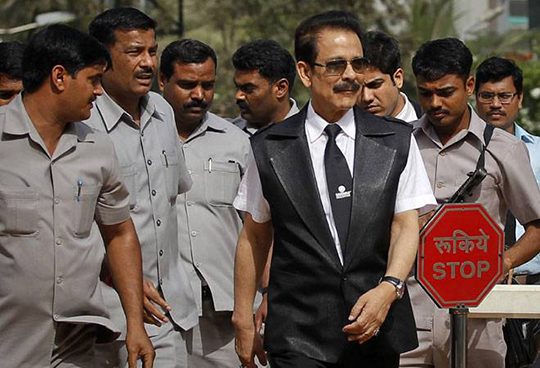New Delhi, Sep 2: Supreme Court today asked the Sahara Group to come clean by disclosing its sources from where it had raised Rs 25,000 crore and paid its investors in cash, observing that it is "difficult to digest" as such a huge amount "cannot fall from the heavens."

"You (Sahara Group) tell us what is the source of this money? Did you get the money from other companies or other schemes to the tune of Rs 24,000 crore? Withdrew it from bank accounts? Or sold property to get it? It should be any of the three alternatives. Money did not fall from the heavens. You have to show from where you have got the money.
"Though we don't doubt the capacity of your client to pay crores of money to investors, that too in cash in two months. But the entire explanation of the episode is difficult to digest. Tell us the source of the cash and there will be no need to open the pandora box," a bench headed by Chief Justice T S Thakur said.
The bench, also comprising Justices A R Dave and A K Sikri, which will hear the matter on the issue again on September 16, said "you start the hearing on that date by disclosing from where you got the money."
"Show us the documents. How the money was lying in other schemes," the bench said after senior advocate Kapil Sibal, appearing for Sahara Chief Subrata Roy, submitted that the group had raised money and paid to its investors in cash and the market regulator SEBI was running away from finding out crores of investors.
"This is your (Sahara's) claim. SEBI has a very simple question. Please tell us from where you got the money. You tell us and we will close the case. You tell us how you raised Rs 25,000 crore in cash," the bench said.
Sibal said the group was open for any probe and even assuming that there is an apprehension that it is a case of blackmoney, the group can be investigated but "if it's black money, who is SEBI to investigate? It is matter of Income Tax (Department)."
However, the bench said the onus was on the business house to reveal the source of the money, whether it is accounted money or unaccounted money.
"Was it lying in your bank account or you got it from schemes floated by you," the bench said as Sibal tried to convince that the Group drew money from others schemes in which the investment was made.
"I have already filed an affidavit," Sibal said.
Meanwhile, the bench also asked SEBI to respond after properly examining the plea made by Sahara group in its fresh application seeking permission to borrow money from a foreign entity for raising the amount for securing Roy's interim bail.
For the interim bail, the court had put conditions on Roy like depositing Rs 5,000 crore in cash and a bank guarantee of equal amount and tough terms, including payment of the entire Rs 36,000 crore, including interest, to be paid back to the investors.
When Sibal was drawing attention to the fresh plea, the bench asked senior advocate Arvind Datar, who appeared for SEBI, to respond to the application after carrying out a thorough investigation.
"You look into all the aspects with a pinch of salt. We are not convinced with the application. You investigate thoroughly and properly," the bench told Datar.
The bench said it has never restrained Sahara from raising the money.
The group's application had stated that Sahara needed to borrow money from Reuben brothers of United Kingdom for depositing it in the SEBI-Sahara account opened at the apex court's direction for refunding money to investors.
It had earlier informed the court that the loan on overseas hotels that was given by Bank of China has been taken over by billionaire brothers David and Simon Reuben of United Kingdom, whose main activities were in real estate, private equity and venture capital.
Roy, on August 26, had offered in Supreme Court to pay an additional Rs 300 crore to SEBI but said the amount should be adjusted as bank guarantee.
Sahara had also informed the court that it was negotiating the sale of its three overseas hotels -- Grosvenor House Hotel in London, New York Plaza and Dream New York hotels.
On August 3, the court had extended Roy's parole till September 16 with a condition to deposit Rs 300 crore with SEBI.
Roy's parole, granted on humanitarian grounds following the death of his mother, was extended after he had deposited Rs 300.68 crores, giving him the opportunity to raise the remaining amount to secure bail in the case.
The apex court had allowed Sahara group to go ahead with sale and alienation of their properties to raise an amount of Rs 5,000 crore as a bank guarantee which they have to deposit in addition to Rs 5,000 crore to get bail for Roy.
The Sahara chief had earlier told the court that by December, the group would be in a position to fulfill all the conditions and that talks were going on with Canara Bank for Rs 1,500 crore bank gaurantee.
The apex court had passed an order on March 29 stating that SEBI would not sell any property owned by the beleaguered group for a price less than 90 per cent of the circle rates for the area in question without the permission of the court.
The court had asked SEBI to initiate the process of selling "unencumbered" properties of Sahara group, whose title deeds are with the market regulator, to generate the bail money for release of the group chief.





Comments
Add new comment